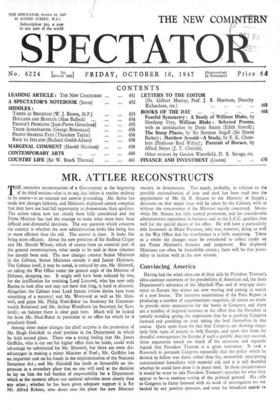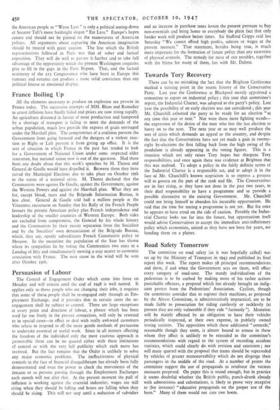Convincing America
Having had the wind taken out of their sails by President Truman's ultra-cautious statement of the possibilities of American aid, the State Department's advocates of the Marshall Plan and of stop-gap assis- tance to Europe this winter are now veering and yawing in search of a new breeze. The intensive examination of the Paris Report 13 producing a number of supplementary enquiries, all meant no doubt to provide more ammunition for the battle in Congress, and there are a number of inspired rumours to the effect that the President is cannily avoiding giving the impression that he is pushing Congress forward and gambling on their taking the lead themselves in due course. Quite apart from the fact that Congress are showing singu- larly little signs of anxiety to help Europe, and apart also from the dreadful consequences for Europe if such a gamble does not succeed, these arguments smack too much of the recurrent and arguable legend that President Truman is a great statesman. It took a Roosevelt to persuade Congress repeatedly that the policy which he desired to follow was theirs rather than his, meanwhile anticipating constitutional formalities with material aid, and it is still doubtful whether he could have done it in peace time. In these circumstances it would be wiser to take President Truman's speeches for what they appear to be—a cautious testing of the political ground. His calls to Congress to hurry forward with its work of investigation are not backed by any positive pressure, and even his broadcast appeal to
the American people to "Waste Less" is only a political toning-down of Senator Taft's more forthright slogan "Eat Less." Europe's hopes cannot and should not be pinned on the manoeuvres of American politics. All arguments about capturing the American imagination should be treated with great caution. The line which the British representatives followed in Paris was that of sober and factual exposition. They will do well to pursue it further and to take full advantage of the opportunity which the present Washington enquiries give to fill in the gaps in the Paris Report. That, and the factual testimony of the 215 Congressmen who have been in Europe this summer and autumn can produce a more solid conviction than any political finesse or emotional display.



































 Previous page
Previous page